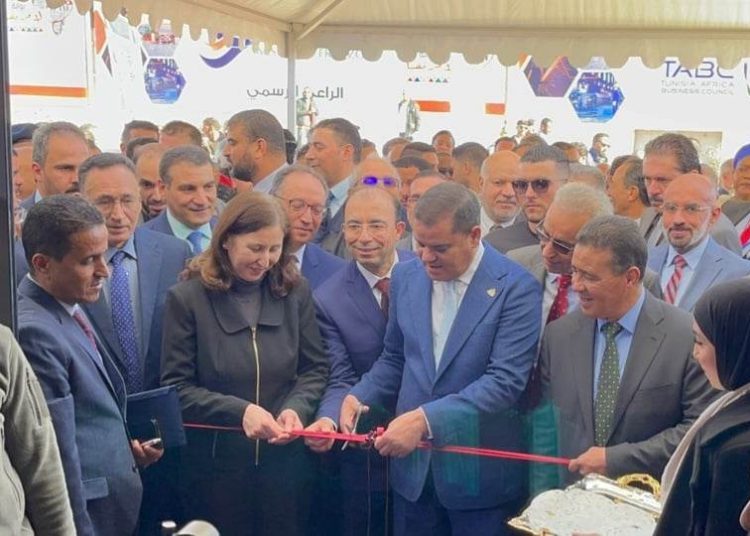Over 100 industrial and commercial Tunisian establishments participated in the Libyan-Tunisian Exhibition for the Development of Industry and Trade held in Misrata from 16 to 18 January.
The event was inaugurated today by Libyan prime minister Abd Alhamid Aldabaiba in the presence of Mohamed Hwej, Minister of Economy and Trade, a number of undersecretaries of the Ministries of Trade and Industry, Fathi Al-Amin, Chairman of the Misrata Chamber of Commerce, Industry and Agriculture, a group of owners of Libyan Industrial and Commercial Companies, with the participation of a Tunisian delegation that includes 100 industrial and commercial establishments headed by the Minister of Equipment and Housing, Sarah Zafarani Zanzari.
More than 500 Tunisian business leaders participating
In a telephone conversation with Libya Herald, Anis Jaziri, Chairman of the Tunisia-Africa Business Council (TABC), confirmed the participation of a Tunisian delegation of more than 500 businessmen and women who arrived at Misrata Airport on four flights from Tunis and Sfax, in addition to several others who arrived by land.
Aiming for LD 3.5 billion trade exchange in 2023
He expressed his hope that the Misrata exhibition, which was initiated by the TABC and some other professional organizations since 2018, would raise the volume of trade between the two countries to 3.5 billion dinars in 2023.
High African demand for Tunisian and Libyan goods
In the same context, Fathi Al-Amin, Head of the Misrata Chamber of Commerce, Industry and Agriculture, told Libya Herald that the exhibition comes out of coordination and cooperation between the Libyan and Tunisian economic institutions to enter the growing sub-Saharan African markets, which are considered active markets and have a high demand for goods and services available in Tunisia and Libya.
Complementarity between Tunisia and Libya in penetrating African market
Al-Amin referred to the ability of Libyan industrial enterprises, with the support of partners from Tunisia, to achieve expansion and spread in the African continent. This was due to the good material and economic resources Libya possesses, and the expertise and competitiveness of the Tunisian economic institutions.
The African market is a natural step
He stressed that moving towards sub-Saharan African countries is a natural step for both countries, given the low competitiveness, the scarcity of goods from other countries, and the growing purchasing power in many countries of the continent, with mostly good growth, according to World Bank data.
Libya-Tunisia: One gateway for transit trade to Africa
Al-Amin saw Libya and Tunisia as one gateway to sub-Saharan African countries, which means the establishment of a transit trade that is beneficial to the economy of Libya and Tunisia, provided that a joint plan is drawn up to establish an integrated infrastructure in the two countries, including roads and integrated service centres for the transit trade.
Regarding the number of participating companies and economic institutions, Al-Amin said that the Misrata Chamber of Commerce, Industry and Agriculture has approximately 30,000 members, including dozens of industrial companies and hundreds of commercial and service institutions, of which more than 100 institutions participated in today’s event.










